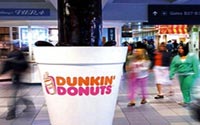research
CMOs Eye Disparity: Local Marketing Wishes, Reality
- by Tanya Gazdik , October 31, 2011

Nearly 50% of marketers surveyed by the Chief Marketing Officer Council believe localized marketing is essential to business growth and profitability, particularly as it relates to demand generation and sell-through of products and services.
However, just 27% of marketers have embraced local marketing automation platforms, resources and tools compared to 62% who either don’t have or are only now evaluating these options, according to the report, “Localize to Optimize Sales Channel Effectiveness,” which surveyed more than 300 brand marketers across all leading industry sectors. Only 12% see themselves as being highly evolved and knowledgeable, and 86% are looking for better ways to localize messaging, campaigns and outreach.
Surprisingly, the report (co-sponsored by Brand Muscle, Matchbin, MediaTile and MarketClik) also reveals that sites like Groupon and LivingSocial are not the top choice for national brand marketers looking for local outreach.
advertisement
advertisement
When asked what channels drive the most value and return, only 2% (of the 6% who use the sites) point to these local merchant marketing models. Instead, national brands looking to connect locally with consumers rely more on experiential events, direct mail, localized Web sites, social networks, electronic messaging and interactive digital signage.
While small businesses and local merchants may gain new customers and awareness of their brand as a result of a group buying deal, large national and global brands have yet to light up on the value of Groupon’s offering, says Donovan Neale-May, executive director of the CMO Council.
“In most cases, Groupon tends to appeal to those selling experiences, not products,” Neale-May tells Marketing Daily. These have more latitude for bundling, packaging and discounting, as well specifying deal redemption times, locations or even types of consumers, he says.
“National product marketers or franchisors, on the other hand, have more difficulty structuring localized deals where they can maintain margin and also have compliance, control, and flexibility/uniformity of deal delivery across all markets,” Neale-May says. “They also don’t want to complicate the lives of their retailers, franchisees, dealers, or channel partners with complex promotions that might result in disgruntled consumers, unprofitable offers or costly refunds. “
Traditionally leery of social media and online consumer-driven marketing models, national marketers tend to invest in controlled media buys and promotional programs that don’t undermine their channels, brand, or pricing policies. However, there is a high demand for a very local buying and service experience, as well as third-party validation -- which, if incorporated into their business mode, would help Groupon and others capture the attention of the other 94% of national marketers, he adds.
Brands say they intend to expand localized marketing budgets (23%), explore new localized engagement channels (49%), and improve localized content delivery (54%). Print and broadcast/cable media are losing ground to more targeted, personalized, interactive and measurable forms of local engagement across diverse audiences and communities.
Commitment to local marketing takes time, effort and expertise, Neale-May says. “There are budget, resource and bandwidth constraints for many national marketers,” he says.
Understanding the diversity and dynamics of local markets and audiences is one challenge. Having internal or external resources to handle the complexity of multiple creative executions and content localization needs is another, he says. “Sourcing the necessary data, insight and intelligence to make smart localized marketing decisions is a third,” he adds. “As a result, marketers tend to go with localized media buys rather than truly localized campaign executions so they don't necessarily resonate within communities and demographic targets the way they should.”




